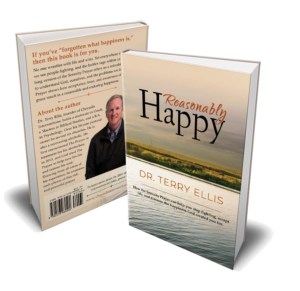Dr. Terry Ellis has a Ph.D. in Greek, a Masters in Biblical Studies and a degree in Psychology. He was a Baptist pastor for 34 years. Dr. Ellis is also a recovering alcoholic and founder of Chrysalis Interventions, an addiction intervention mission. I visited with him about his latest book, Reasonably Happy, based on the “long version” of the Serenity Prayer. This is my interview with him.
By: J.R. Whaley
Q. Before we get into your book, Reasonably Happy, tell us how the idea for the book came about.
A. I came across the long version of the Serenity Prayer when I was in treatment for alcoholism. I found it deeply moving, promising and full of profound theological ideas. I began to pray daily and later decided to write this book about it because it can help everyone.
Q. Many know that the Serenity Prayer is popular in 12-Step Programs. Why do you think it has utility for even those who are not in recovery?
A. The Prayer was not written for people struggling with addiction. 12-Step programs adopted it because it has a special application for them. All of us experience pain and struggle. That’s the real core of the Prayer and the book—how do you handle difficulties in your life? How do you handle pain?
Q. A lot of the principles in that prayer seem universal. “Living one day at a time, enjoying one moment at a time, accepting hardship as the pathway to peace” doesn’t sound a lot different than the Four Noble Truths. You’re an ordained Baptist minister. What do you say to those folks who are not Christian or might even be turned off by religion? Does your book and the Serenity Prayer have any use for them?
A. Navigating life well means determining what is most important and then giving priority to those things. There is an unbroken thread of common wisdom woven through any successful paradigm. The Prayer touches that thread gives expression to it. I often encourage individuals as a starting point to find something that is true, good and beautiful, then use that as an axis around which to build your life. Of course, I find the Christian faith to be that positive, central axis. But everyone has to start somewhere other than themselves. That commitment will bring you in touch with the thread.
Q. Americans have the inalienable right, according to the Declaration of Independence, to life, liberty and the pursuit of happiness. Is aiming to be “reasonably happy” aiming too low? What do you mean by being reasonably happy?
A. Everyone is shooting for cloud 9! That’s the problem. Cloud 9 is almost always unattainable, but cloud 4 is pretty good. It’s reasonable. And even when there is no cloud at all, you’re not alone. That’s being reasonably happy.
Q. It seems that much of our “happiness” is based on “happenings” … I win the case, my kid makes the goal, we have a great vacation. But those feelings don’t last.
A. And they’re not intended to. There’s nothing wrong with life going your way, and honestly, if we really look objectively, we live with an astounding degree of comfort, safety, potential and success. But these “happy things,” while good, are only echoes of a far deeper reality. My real goal in the book is to help people recognize the reasonable happiness they can enjoy but then introduce them to that deeper reality.
Q. One of the ideas of the Serenity Prayer is asking for the “wisdom to know the difference” between things that can be changed and things that cannot be changed and have to be “accepted.” How do we get that kind of wisdom? And can you tell me the shortcut? Please?
A. Ha! Instant gratification will never give you the life you want. We have to fight to gain that wisdom, and some battles simply don’t stay won. Stay close to the source of wisdom.
Q. A lot of Type-A people hate the idea of surrendering to anything. How does the idea of acceptance or surrender compare with passivity?
A. Frankly, the majority of Type-A’s I know are unhappy and unsure why. It’s a hard and uncomfortable truth, but trying to bend life (or people) to your will is going to make you unhappy, neurotic and unpleasant. Acceptance is not giving up. It’s letting go of your demand that reality conforms to your will. Surrender means that you’re not buying into a DIY life. You’ve found something transcendent to guide and empower you. And here’s the irony: that kind of acceptance is controlled.

Life is sometimes hard. And messy. And unexpected. How do we maintain a sense of happiness in spite of all of that?
If your only metric for happiness is your scorecard, then yes, at some point, the score is going to go catastrophically against you. This is without exception. I simply have no sufficient answer to this important question apart from knowing that in those moments, there is a good and loving God who is with you. God weaves collateral grace into the very worst suffering. You can find it if you know where to look. That’s the nature of providence, God’s plan. Our suffering can become the occasion of our redemption.








Leave A Comment